How likely is human extinction due to climate change? Neil Bowerman, a former climate physicist who is now at 80,000 Hours, addresses one component of this question — the future physical habitability of Earth — by surveying possible routes to extreme levels of warming and ways in which extreme warming could lead to uninhabitability.
We’ve lightly edited Niel’s talk for clarity. You can also watch it on YouTube or read it on effectivealtruism.org.
The Talk
Introduction
I'm going to be talking about whether climate change could make Earth uninhabitable for humans.
We already know that climate change is causing in the ballpark of hundreds of thousands of premature deaths. This is likely to increase to as many as hundreds of millions over the coming decades. Climate change is already having substantial impacts on a wide range of areas from Arctic sea ice melt to flooding and other areas. We have a sound economic case for addressing climate change, and it is harming the poorest people the most. And yet these are also the people that have least contributed to climate change, creating a climate justice issue. Overall, as we look at the picture, it doesn't look good.
But I'm talking here only about the medium-case scenario. As a longtermist interested in existential risk, I want to address the tail risk issues on climate change. And so that's what I'm going to be talking about for the rest of this talk: looking at how climate change contributes to existential risk.
The relationship between climate change and existential risk
Let's start by defining existential risk. It means human extinction or the permanent and drastic curtailment of humanity's long-term potential. So how might climate change contribute to existential risk?
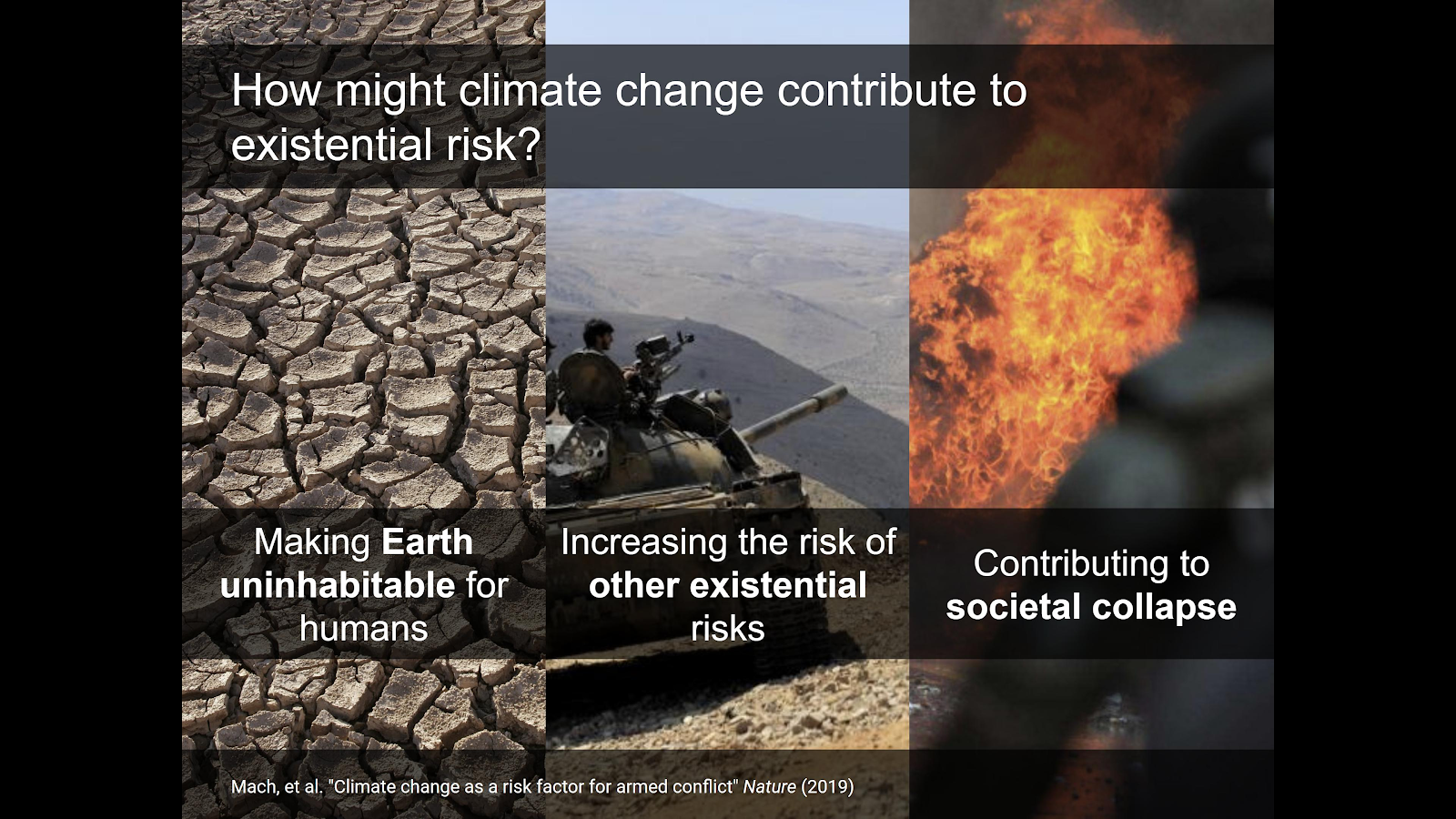
As I see it, there are three main ways. (There's a bunch of ways that you can slice the cake here, but I found the following framework useful as I think about this issue.)
- Making Earth uninhabitable for humans.
- Increasing the risk of other existential risks.
- Contributing to the likelihood of societal collapse.
Now, if I had to guess, I would guess that the second and third risks here — the contribution to other existential risks and to societal collapse — are probably larger than the first, but they're also less tractable to study.
And so I'm going to do the thing that academics often do: ignore the big important things and address the thing that I know about as a climate physicist. We're going to be setting the second and third risks aside and focusing primarily on this question of making Earth uninhabitable…
The risk of societal collapse
...except for the next slide, where I want to talk briefly about societal collapse. So what do I mean when I talk about the chance of societal collapse? What I'm talking about here is that I'm gesturing at something in the vicinity of a complete breakdown of political institutions, a collapse of international trade, and really a breakdown of the fabric of society. To make this really concrete, I'm talking about a reduction in global GDP of more than 80% in less than a decade.
This would be drastic and very dramatic, but I have no idea how likely it is to occur. I also have no idea how likely it is that societal collapse would contribute to existential risk. And I don't know [how climate change might influence the interaction between societal collapse and existential risk]. But I would guess that [collapse] is one of the biggest avenues for climate change to contribute to existential risk. And so I'm excited to see further study of this.
Fortunately, the folks at the Cambridge Center for the Study of Existential Risk are starting to think about this. They've got a couple of papers in drafts that I've put down in the bottom of the slides where they're starting to use a systems perspective to think about some of these questions. But I'm now going to set aside societal collapse and contribution to other risks and focus on the thing that I can actually give a talk on, which is the chance of Earth being made uninhabitable for humans due to climate change.
What does it mean for Earth to be “uninhabitable”?
I want to start by saying that this is a really high bar. For Earth to become uninhabitable to humans, that means that humans have to be able to survive nowhere on Earth, in any of its wide-ranging climates [even after the Earth becomes much warmer and cold climates become more habitable]. This is a really high bar to meet.
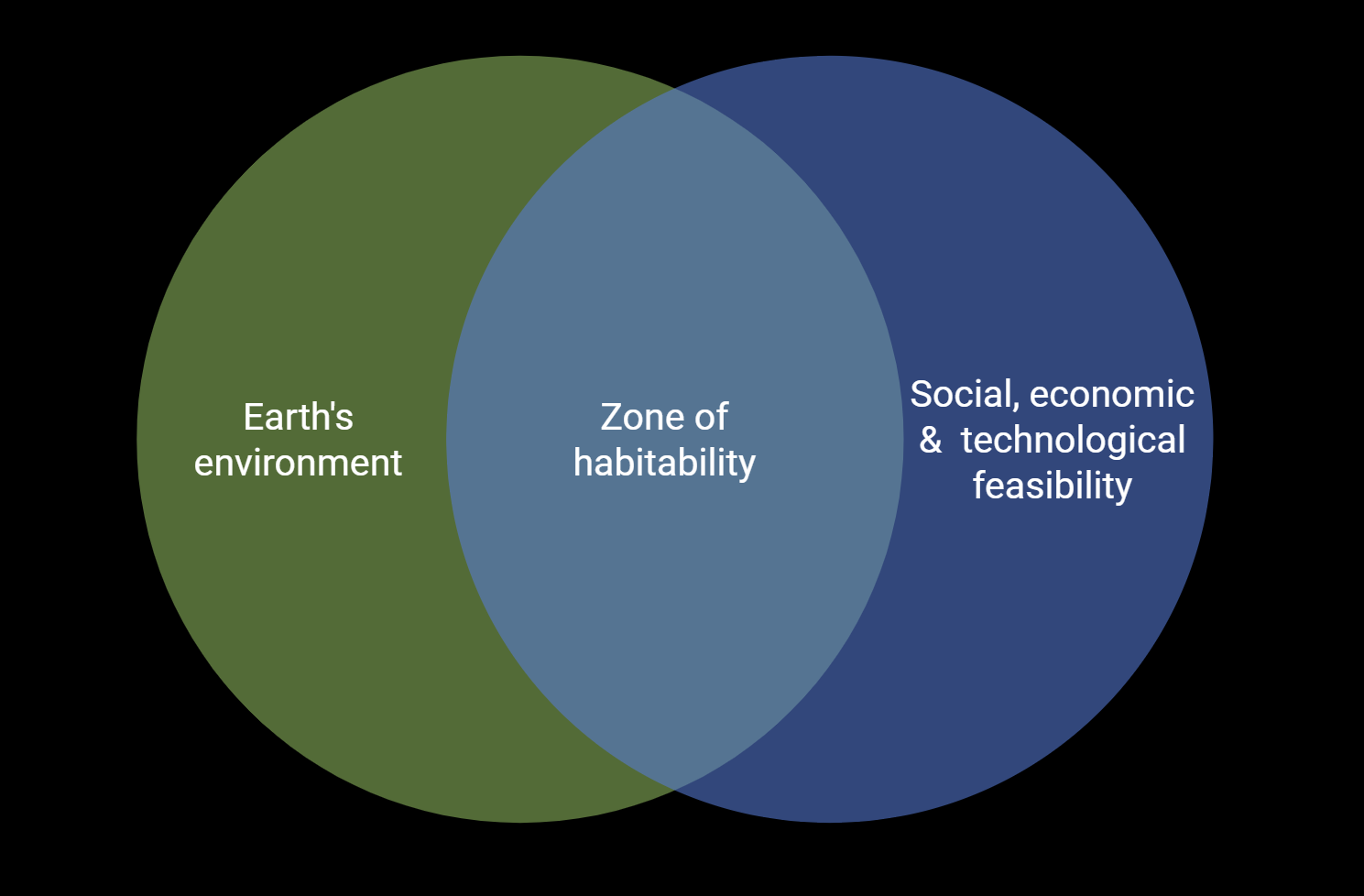
But it's worth saying that habitability is really a function of two things. One is the environment of Earth, and the other is the set of social, technological, and economic factors and tools that we have available to us. And so if I had to put my finger in the air and guess, I would guess that if our economic and technological trajectory continues on as it is, it's pretty unlikely that Earth will become uninhabitable, simply because we have the tools and the technology to survive in such varied climates. We [are working to create] habitats on the moon or on Mars, and living on Earth under drastic climate change is probably going to be a lot easier than that.
But if we were to experience some form of drastic and dramatic societal collapse and somehow knock ourselves back to the stone age, then I think there's a much more interesting question here: could you imagine a scenario where, under extreme warming and extreme climate change, Earth does become uninhabitable to [humans with Stone Age technology]? That's what I'm going to be addressing for the rest of this talk.
The historical effects of climate change
I want to start by looking at some paleoclimate evidence and thinking about what we can say about the habitability of Earth under some historical climates and some historical climate changes. First, I'm going to talk about the Paleocene-Eocene Thermal Maximum. This happened about 55 and a half million years ago. We saw warming of about 12 degrees above what we currently see today, and yet we didn't see a mass extinction. We didn't see vast species die-off in the way that you would expect if Earth were becoming uninhabitable. Now, this may be some evidence that dramatic warming could be habitable for humans, but the rate of warming was really a lot slower than it is today. So it's not a perfect analogy.
What about a time with much faster rates of change? Well, about 11,000 years ago, humanity emerged out of the end of the recent ice age into what's known as the Younger Dryas. Snow and dust accumulation samples tell us that the Earth warmed by about seven degrees in certain parts in less than a decade. And humanity also survived that, though it was moving from a much colder climate to the climate we enjoy today. So again, not a perfect analogy, but it's maybe some evidence that humanity is able to survive rapid rates of change.
The final example I want to give in this space is just looking at the range of conditions that humans enjoy living in today. Humans thrive in climates as diverse as Bahrain and St. Petersburg — climates that vary in average over 16 degrees centigrade. So this is maybe some evidence that even [on a warmer planet], provided that everything else didn't fall apart around us, we would be able to survive in a range of different climates provided that the environment and ecosystems adapted. But again, really not a perfect analogy because these are static conditions as opposed to moving ones.
Is there a causal chain leading to potential human extinction?
There is [additional] evidence that we can bring to play here. During my PhD, I would talk about this question a fair bit with my old supervisor. He would always say that in order to address climate change as a contribution to X-risk, you need a story you can tell about what events occur that get us from now to a point where Earth is uninhabitable or where humans have gone extinct. And so what I want to do for the rest of this talk is to try and sketch out a story that I find [vaguely] plausible for how we could get there.
I'm not saying this is likely. I'm not saying this is going to happen. I think this is incredibly unlikely. But the challenge I gave myself was: could I tell a story where we get to a world like that? So that's what I'm going to do here.
The long-term potential of global carbon emissions
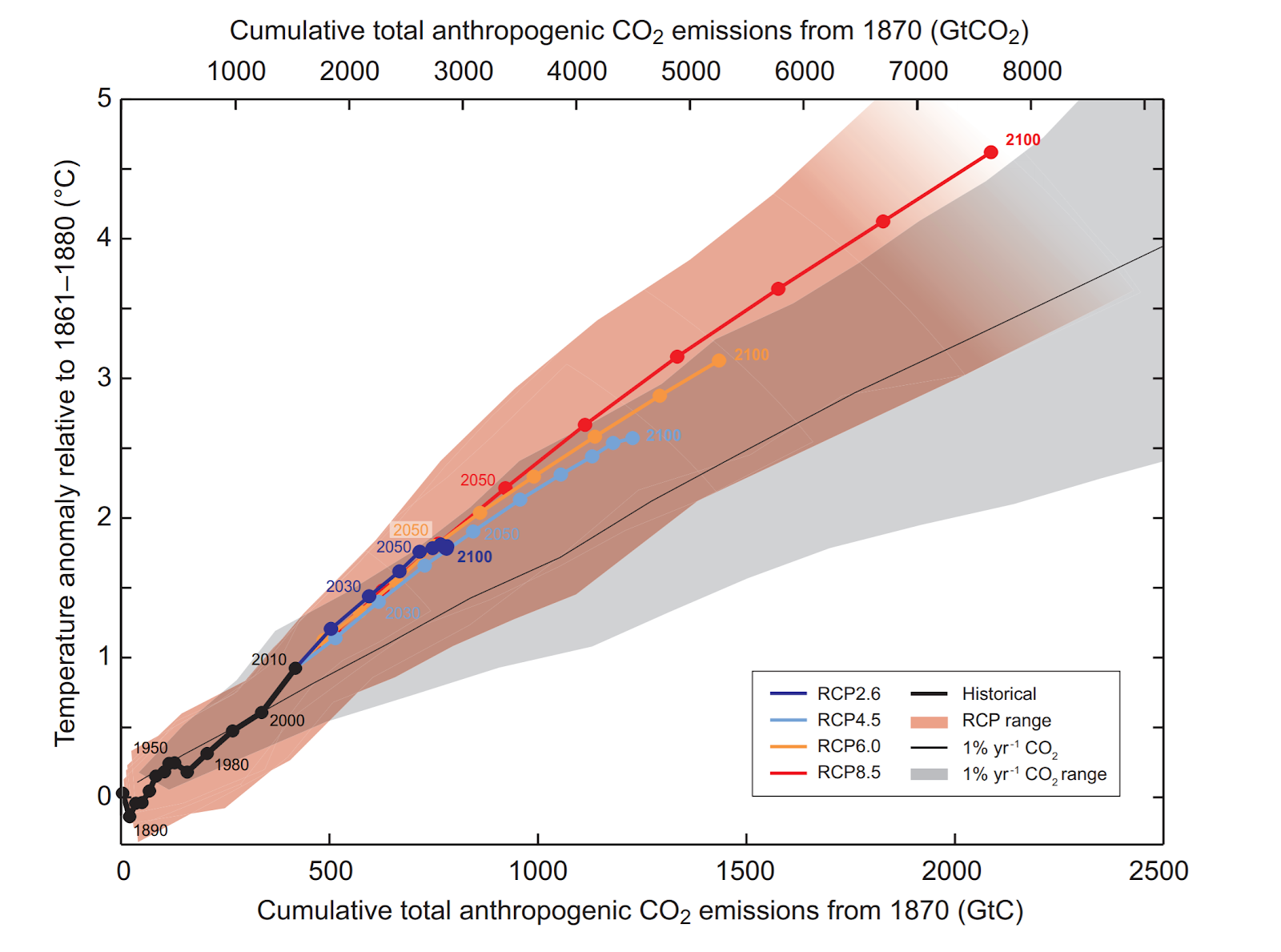
This is not the first time that this graph has been shown in this conference. I think Goodwin showed it in her talk earlier, but I want to briefly talk us through this. So along the vertical axis here, you've got the amount of warming going from zero to five degrees. For context, international climate negotiations are aimed at keeping us below two degrees. Five degrees would be a dramatically and drastically different world from the one that we enjoy today, with mass loss of species, [many risky] tipping points, and all sorts of things that have been covered elsewhere in the conference over the course of the last couple of days. [The slide also shows] how much carbon humanity is burning. The black line [represents the present year]. Today, we have burnt about half a trillion tons of carbon dioxide; by the year 2100, if we carry on burning CO2 under business as usual scenarios, we'll get up to about 2 trillion tons of carbon burnt.
And that's burning the amount of carbon that we would under business as usual. What if we somehow got really carbon-hungry and [eventually] ended up burning all the potentially economically viable carbon [in fossil fuel reserves]?.To [understand the results], we need to zoom out a little bit and continue the axis along here.

This is the range of the graph that we would be looking at if humanity were to burn all of the potentially economically viable fossil fuel reserves that [we currently know of].
If you look at the red band coming up here, this is the one you want to be thinking of, and the question is: where will this red band go to if we end up burning this much fossil fuel? And the answer is, I don't know. There's a whole bunch of complicated climate science that would go into answering this question. People have made careers out of pointing out that this is roughly a straight line so far, but it's probably not going to be a straight line forever. There's a bunch of factors that are going to go into this. But this is more to prime your intuitions that our burning that much fuel would probably lead to a very bad world.
Cloud-based tipping points
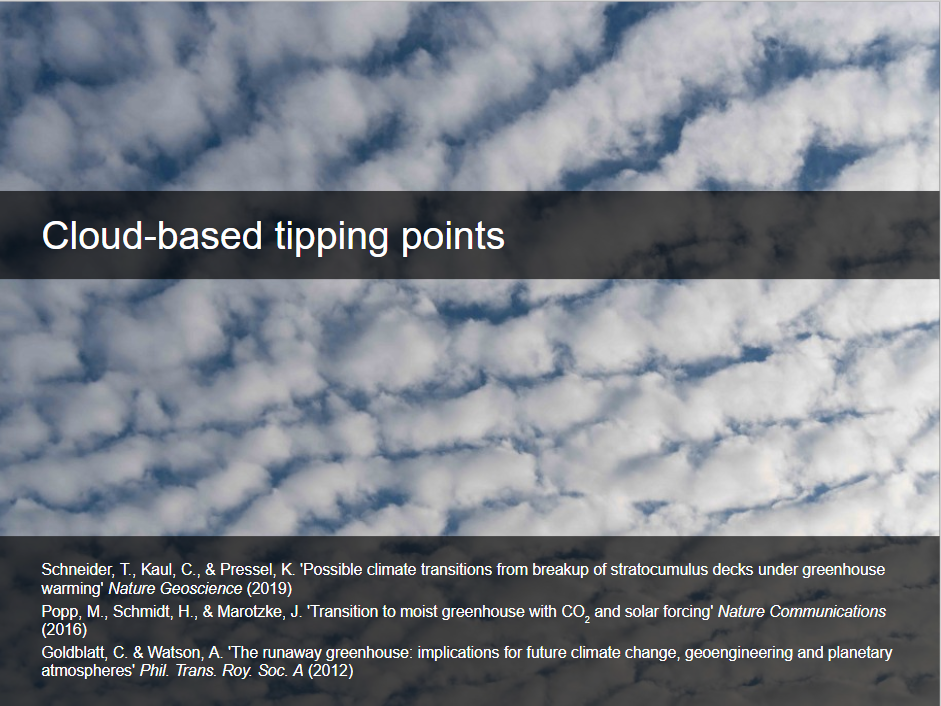
So that's the first pillar of the story that I want to tell. The second pillar of this story is looking at cloud-based tipping points and asking the question: could there even be cloud-based tipping points? Those of you who are interested in the solar system (like I was as a kid) probably know that Venus is actually warmer than Mercury, despite the fact that Venus is further away from the sun. And this is because Venus has a runaway greenhouse effect. Now, it happened differently there than the way it would happen on Earth, but if it were to happen on Earth, it would go something like this:
- Some forcing would heat up the ocean — say, increased carbon emissions or increased energy from the sun.
- The oceans would get a little warmer; they would evaporate a bit more, and that evaporation would put more water vapor into the atmosphere.
- Water vapor traps outgoing thermal radiation (heat). That heats up the atmosphere, which in turn heats up the ocean.
- And so your cycle continues.
On Venus, that just kept going and kept going and kept going until… I think Venus is about 700 degrees centigrade. On Earth, if this were to occur in a very impossible worst-case scenario, you could imagine boiling all the oceans or something like this if the effect didn't stop.
People have looked into this and they've said, "Actually, this isn't really very plausible. You'd need a lot more incoming solar radiation than is ever really going to occur, because we know how the Earth orbits the sun and we know the range of solar radiation that tends to reach Earth and we know this is really not going to happen anytime soon." I think we can rule out this runaway greenhouse effect. But is there something like this that could happen?
Recent developments in climate modelling
Back when I was starting my PhD, which I finished in 2013, there wasn't really a story I could tell like this. But in 2016, an interesting paper came out by Pop et al (2016), which had a very simple climate model with a strange effect: cloud feedback kicked the temperatures up to stabilizing at about 20 degrees [centigrade above current temperatures]. So you basically saw this runaway affect that I've been talking about.
Pop et al.’s model wasn't very plausible; it was incredibly simplistic and it made enough assumptions that no one really believed it. But it started to get people scratching their heads and wondering: Is this a thing that could happen? Is there a feasible mechanism here?
Fast-forward to 2019. As I was reading the literature ahead of writing this talk, I was amazed to find this paper by Schneider et al (2019), which is actually kind of a big deal. It uses another simplistic model of the atmosphere. And what happens in this model is they triple carbon dioxide concentration (the amount of CO2 in the atmosphere). And what they find is that the stratocumulus cloud layer in the tropics would burn away.
Clouds have this lovely white fluffy property that makes them really reflective to incoming sunlight. And so that stops the Earth from warming too much. But when the clouds disappear, the dark ocean underneath of them absorbs a lot of sunlight. And that in turn heats up the ocean. And you remember our story before about heating up the ocean, water into the atmosphere, blah blah blah. And so what happens in the Schneider et al (2019) simple model is that you see eight extra degrees of warming on top of the tripling of CO2 concentrations that happened simply from what they did in the model.
This model, [like Pop et al’s], had a mixed reception from scientists. Some people said, "Hmm, that's really interesting." Others said, "No, it's a simple column model. It's not going to apply globally. We shouldn't kid ourselves enough about this."
But I think it is fair to say that we now at least have a physically plausible mechanism here. Something worth investigating further. And so if we take this simple model and put it in different places on the planet, you're going to see this feedback effect kicking in at different times. And so you're not going to see a rapid jump in the way that you do here, but you might end up seeing an increase in the rate of warming that we get for each ton of carbon dioxide emitted. In climate parlance, you might see climate sensitivity increasing at higher temperatures. And in the latest models that are going into the IPCC [International Panel on Climate Change] report — the sixth one that's coming out in 2021 — they do start to see some of this effect where at higher temperatures you see more warming per unit of carbon dioxide concentrations than you do at lower carbon dioxide concentrations.
We don't really know how big a deal this is. We don't know if this is going to be a big deal or a small deal, but at least there's some evidence that maybe this is the thing we should be worrying about. And so what I've been doing here is scratching my head and asking myself: can I tell a plausible story about how Earth becomes uninhabitable due to climate change? These are the two main pillars that I'm looking at.
How does that lead to uninhabitability? Well, mainly I'm going to ask you to use your imagination regarding a world with 20 to 30 degrees [centigrade] of warming. But these are some of the things that would be kicking in. I gave a longer version of this talk where I go into the details on some of this, which we don't have time for now, but maybe we can get some of the details through the Q&A.
Conclusions
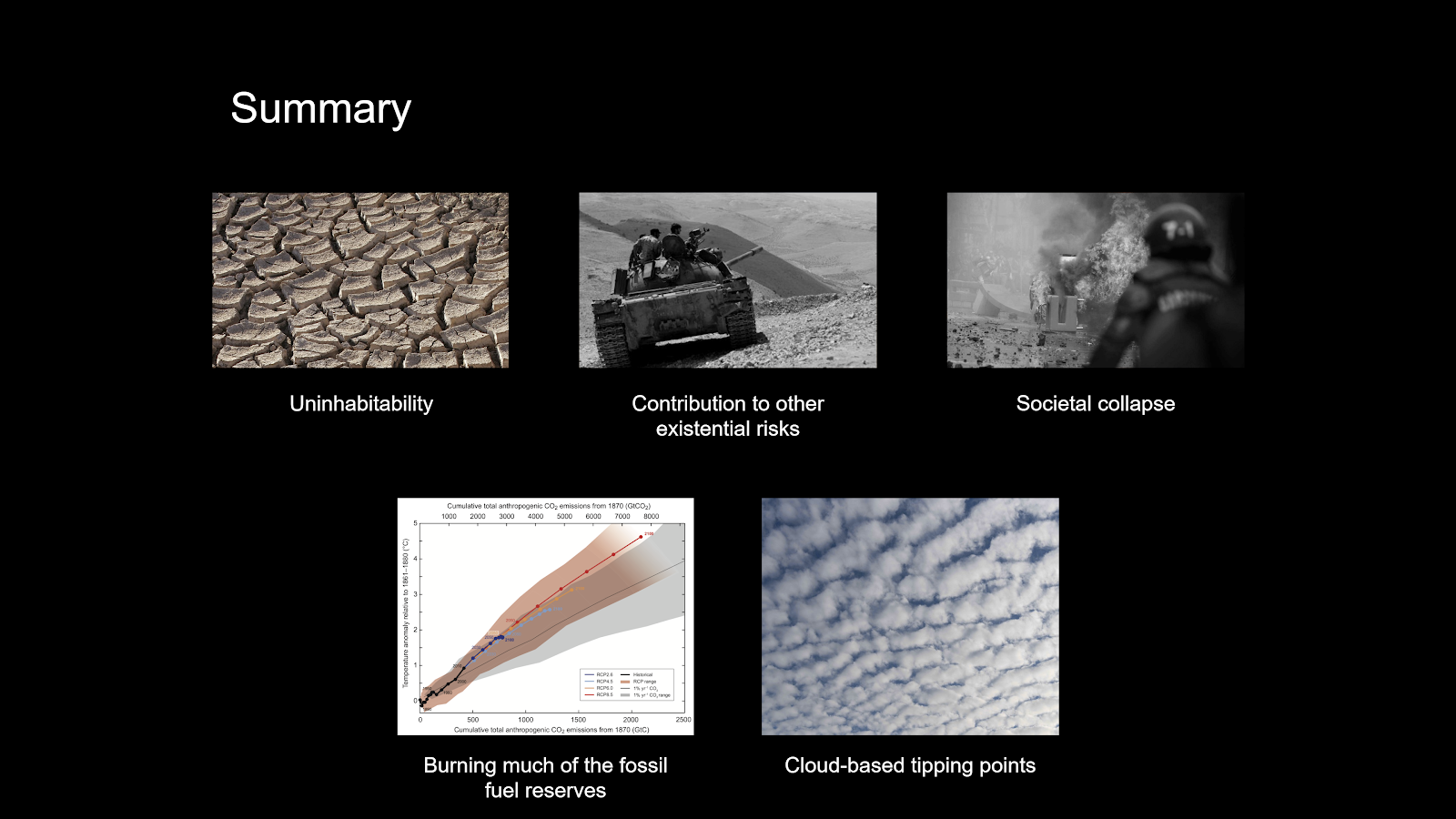
To sum up here, we've asked the question of how climate change might contribute to the probability of existential risk. I highlighted these three things: the chance of making Earth uninhabitable, the contribution to other existential risks, and [the effect on the probability] of societal collapse. And I ruled out the second and third because they weren't things I know much about, even though they're probably the bigger terms going on here, and focused on the uninhabitability point.
We then saw what it would look like to burn a lot of fossil fuels, and how that could lead us to a really warm climate. And then we hypothesized and spitballed about cloud-based tipping points, and how maybe that's a thing that we should pay attention to. Maybe, I don't know. And together, these things gesture in the direction of a story of how Earth might become uninhabitable.
So as you can tell, this was a pretty shaky line of argument. But for me, at least, it gestures in the direction of this idea deserving further study. And I'd love for people to go away and think about each of these different parts — uninhabitability, contribution to other X-risks, and societal collapse — and maybe investigate some of these uncertainties, with a particular focus on thinking about the chance of climate change really contributing to humanity going extinct altogether.
Thank you all for making it through this late on a Sunday afternoon. I'll now open this up to Q&A. Thanks.
Q&A session
The epistemic status of climate change science
Nathan Labenz: I wanted to start with the epistemic status of climate science in general. I think this is an audience [that examines some topics with] a tremendous amount of rigor. In the session before this, we looked at questions as (seemingly) tractable as: “If you give people more money, will they be better off?” And the answer is yes, but it's a lot harder to prove that than you might think. And then on the far end of the spectrum, you've got questions like: “Do insects suffer? And if so, what might we be able to do about it?”
Climate science is probably somewhere in the middle, but it seems to be hotly debated. And I find that this is an area where it's hard to get clarity as an outsider on just how solid all of the science is. So maybe you could give us your perspective on all of that.
Niel Bowerman: Yeah, I would love to. So what do we know? We know for certain that the world is warming, we know for certain that carbon dioxide concentrations are going up, and there's a lot of consensus on the physical mechanisms whereby those carbon dioxide concentrations would lead to warmer temperatures. I think that 97% of scientists agree that climate change is most likely caused by humans.
When we zoom out and talk about climate change as a contribution to existential risk, now we're just conducting pure speculation. This talk isn't really a talk about rigorous science. This is talk about Neil standing up on stage and spitballing for half an hour. And so this talk isn't really supposed to try to convince you of anything. This is more of a prompt to encourage people to go and work on this question a bit more and try and pin down some of these answers. Because I think that other than maybe my first slide, everything I've said today is largely speculation — but it's speculation trying to get at the question of where this chance of extinction might lie, which is very important from a longtermist perspective. If we come at the problem from this perspective, then I think there are a bunch of really interesting questions to ask that I'd love to see the broader community addressing.
The expected severity of climate change
Nathan: Sticking with more mainline questions just for a second: Some of your earlier comments toward the beginning of the talk suggest that your outlook would be: “Humanity will be pretty adaptable. Yes, there will be costs to climate change, but in the absence of a story where other things happen as knock-on effects, the mainline expectation is not so bad.” Is that a fair reading of your view?
Niel: Yeah. It depends on what you mean by “not so bad”. I expect tens of millions, maybe even hundreds of millions of people to die prematurely because of climate change. And that's really bad. It's similar on a vague scale of badness to things like the number of people that die in traffic accidents. So when you look at climate change [having this level of impact] over many decades, it's very much a big problem.
And then, from a longtermist perspective, my question is: “Where does it rank relative to the other existential risks?” If I had to guess, I would guess that it's maybe lower down on the list of things likely to contribute the most to existential risks than, say, AI or biorisk. I'd put it more among the cluster of things like nuclear weapons and geoengineering. For me, that's still very much a thing deserving of attention and worth working on, and whether it's really bad depends a lot on your definition of “really bad”.
The urgency of tackling climate change
Nathan: Not to be anchored to the mainstream questions, but do you feel that it is time now to be mobilizing and transforming the economy [to reduce emissions], or do you feel like the jury is still out on that and we don't really have the mechanism for a plausible story about really bad outcomes that would demand [economic transformation] at this stage?
Niel: Oh, for sure. I think we should be cutting carbon emissions much, much more dramatically than we are right now. I think we should be going to net zero emissions. I think there's a relatively solid economic case. So this is a good idea and [will give us] a positive return on our investment. My guess is that we should be keeping the total amount of carbon that humanity admits to less than a trillion tons, which would hopefully keep us at less than two degrees of warming.
Nathan: And that's double what [we’ve emitted] in all of history?
Niel: Yeah, exactly. So we can emit [as much carbon] in the future as we've emitted in the past, and that means making pretty dramatic and quick reductions.
Nathan: That would happen in the next 50 years? Business as usual?
Niel: Yeah. Or less. We need to start cutting carbon emissions in the next few years.
The climate impact of methane clathrates
Nathan: Is there a story about methane deposit release that would crack your set of possible narratives here? I don't know a ton about it, but it's supposed to be the most powerful greenhouse gas. There's a lot of it sitting at the ocean floor and in the Tundra.
Niel: Yeah, methane clathrates. This is one of the things that I've always been a little worried about. The thing about methane clathrates is that they are very slow to bubble up. So in most of the plausible scenarios that we see, unless you go into the sorts of crazy scenarios that I was talking about, you end up seeing methane clathrates not emerging for something like hundreds or maybe even a thousand years after you see your initial warming.
If we got the climate science wrong, or if the bottom of the ocean heated up way faster than we expected, then you could see [clathrate emergence] happening faster. But the ocean doesn't really turn much in the vertical direction. Almost all the movement in the ocean is horizontal. So this just makes it very hard for heat to propagate downwards. And that means it's going to take a little while for those methane clathrates to heat up.
Promising areas for further research
Nathan: Okay, cool. That's very interesting. So you've covered this one a little bit, but: how important is it for people to work on this? I think your suggestion would be that exploring the corner cases or the far-out cases is really where the highest value work is to be done.
Niel: That'd be my guess. Yeah. I'm excited to see people exploring societal collapse like the PhDs at Cambridge are doing. [More people should be] looking at some of these worst-case scenarios and [how feasible they are]. And also, geoengineering is a giant question mark in my head. I don't really understand how that interacts with existential risk [from societal collapse]. But my guess is that people should be figuring that out, too.
Nathan: You may want to pass on this because we don't have a ton of time, but how does this 20-degree warming translate to true uninhabitability?
Niel: This part I didn't really know, I would again just be spitballing here, but when you look at agricultural yields, they start dropping off a cliff at some point. And then if we move agricultural zones up into the poles, you end up with very different growing seasons than the ones that they were built for. We don't have a great sense of how that would work. But the most likely story you could tell is something involving societal collapse, and the breakdown of society having a bunch of other bad knock-on effects.
The relative importance of climate change for effective altruism
Nathan: How have your views changed about all of this over time?
Niel: My guess is that my views on climate change have stayed relatively stable over time, and my views on the importance of working on AI have gone up. For me, climate change still seems just as important as when I worked on it as my full-time job. And now that there's a ton of folks flooding into AI policy and AI safety and things like that, my guess is that it's time for EAs to revisit working on climate change tail risks and nuclear weapons and geoengineering and some of the other problems in this space.
Carbon taxes and other interventions
Nathan: Options that we have to address carbon immediately would include a carbon tax, carbon capture, and maybe some others you'd want to list. How do you think about a more conventional carbon tax, versus a carbon capture (which might fall under geoengineering, depending on the strategy). What do you think we should be pursuing first to reduce carbon?
Niel: On the immediate question of carbon taxation versus carbon capture: carbon capture is an unproven, very expensive technology, and carbon taxation is a very proven but somewhat politically infeasible mechanism. I'd be way more excited about a carbon tax. A carbon tax of the right size, if implemented across the world, could go a really long way to helping solve climate change. I don't know about the political feasibility of this, but if it were implemented, it would do a lot of good. Carbon capture, I think, is going to be very expensive and is a long way off, but it's hopefully part of the solution in the future.

Interested to know more about the estimated death toll from climate change - I'm finding the figures you give hard to believe.
You mention 'hundreds of millions' of deaths in coming decades - what's the source for that? You cite the WHO, which talks about "250,000 additional deaths per year between 2030 and 2050", or 2.5million per decade.
Your source for climate change having caused hundreds of thousands of deaths so far gets there by calculating excess deaths from a European heatwave, but presumably warming also caused a warmer winter and so fewer deaths from cold - the paper doesn't discuss that, surprisingly.
Are there more rigorous estimates out there?
(citations taken from Louis Dixon's notes on your talk)
Louis Dixon has written a helpful summary of this talk here. It also has some interesting discussion in the comments: https://forum.effectivealtruism.org/posts/NLJpMEST6pJhyq99S/notes-could-climate-change-make-earth-uninhabitable-for